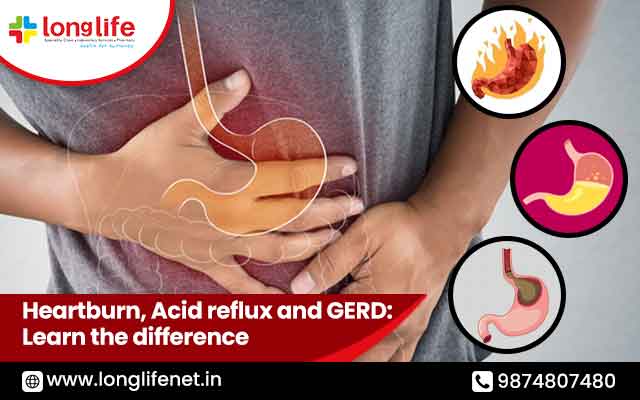The terms heartburn, acid reflux and GERD are often used interchangeably, though they carry distinct meanings. Acid reflux occurs when stomach acid flows back into the oesophagus, whereas Gastroesophageal reflux disease (GERD) is its chronic form. Heartburn is an indication of acid reflux and GERD. Below, the best gastroenterologist doctor in Mukundapur has delved into their differences.
Difference between heartburn, acid reflux and GERD
Heartburn
It occurs within your digestive system, particularly in the oesophagus, and is characterized by mild to severe chest pain. People often confuse it with a heart attack. The oesophagal lining, being more delicate than that of the stomach, reacts to the acid in the oesophagus, causing a burning sensation in one’s chest. If heartburn is coupled with symptoms such as swallowing difficulties, a lingering cough, aggravated asthma, unintentional weight loss, nausea, vomiting, and bleeding, it needs immediate medical intervention.
Acid reflux
Acid reflux refers to the regurgitation of stomach contents into the oesophagus. The sensation commonly associated with acid reflux is known as heartburn, often experienced post-meals or while lying down.
Connecting the oesophagus and stomach is a circular muscle called the lower oesophagal sphincter (LES). It plays a crucial role in tightening the oesophagus after food passes to the stomach. When the LES is weak or fails to tighten the oesophagus properly, stomach acid can flow backwards into the organ, leading to acid reflux.
Apart from heartburn, the symptoms of acid reflux also include coughing, sore throat, a sour or bitter taste in one’s mouth, along with a burning and pressurized sensation that may extend up the breastbone.
GERD
GERD is diagnosed when acid reflux occurs more than twice a week or triggers inflammation in the oesophagus. Symptoms associated with the condition include bad breath, enamel damage due to excessive acid exposure, heartburn, the sensation of stomach contents regurgitating into the throat or mouth, a persistent dry cough, asthma, and difficulty swallowing. Chronic GERD may also contribute to the onset of asthma symptoms or dental issues caused by the corrosive impact of stomach acid. In rare instances, GERD can even progress to oesophageal cancer.
Managing Acid Reflux, Heartburn, and GERD
Gastroenterologists of the best diagnostic clinic in Mukundapur recommend making some lifestyle changes to reduce the severity of heartburn and the occurrence of acid reflux and GERD. Avoiding common trigger foods such as tomato-based foods, citrus fruits, onion, garlic, spicy, and fried foods can help. Also, refraining from consuming tobacco-based products may also alleviate symptoms.
Besides making lifestyle adjustments, there are various treatment options for these conditions. Doctors often suggest antacids for relief. In cases where GERD persists despite lifestyle changes and medication, they may recommend surgery.
Nowadays, with effective treatments, people suffering from heartburn, acid reflux, or GERD have no reason to worry. They must reach out to the best gastroenterologist doctor and seek proper medical treatment.

